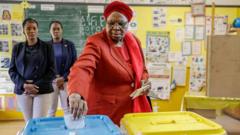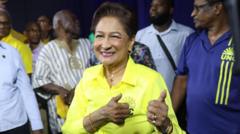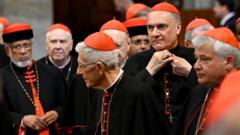Namibia is holding a crucial election that may shift the power dynamics in the country, as both historical significance and socio-economic challenges converge.
Namibia Votes in Historic Election as Ruling Party Faces Challenges

Namibia Votes in Historic Election as Ruling Party Faces Challenges
Voting underway as Namibians choose between stability and change in potential watershed election
Voting is currently underway in Namibia, marking possibly the most pivotal election since the nation’s independence from South African rule 34 years ago. Netumbo Nandi-Ndaitwah is leading the charge to become the country's first female president, representing the ruling South West Africa's People's Organisation (Swapo), which has maintained power since independence. Her candidacy follows Hage Geingob's untimely passing in February, after serving nine years in the presidency.
The upcoming election comes in the wake of rising discontent over high unemployment rates, pervasive poverty, stark inequalities, and ongoing corruption allegations—which have collectively diminished public support for Swapo. Nandi-Ndaitwah faces significant competition, notably from Panduleni Itula of the opposition Independent Patriots for Change (IPC), among 14 additional candidates vying for the presidency.
As polling stations opened at 7:00 AM local time, long queues were seen forming at schools and various voting centers, reflecting the enthusiasm of the electorate. The voting process, which will conclude at 9:00 PM, requires a candidate to secure over 50% of the votes for a direct win; otherwise, a runoff will take place between the top two candidates.
In a pivotal moment, Nandi-Ndaitwah cast her vote in the capital, Windhoek, rallying her fellow citizens to participate in the electoral process, emphasizing that each vote will shape the nation's landscape for the next five years. In addition to breaking gender norms in a male-dominated political environment, she brings over 25 years of government experience to her campaign.
Her rival, Itula—who previously garnered 29% of votes in the 2019 election—expressed the historical significance of the day for Namibia’s democracy while casting his vote. Currently led by interim President Nangolo Mbumba, who stepped in after Geingob’s death, neither he nor any cabinet member is contesting this election.
Analysts predict that the election outcome may hinge on new, young voters, representing over half of the electorate. In addition to selecting a new president, Namibians will also elect members of parliament in this critical election for the future direction of their democracy. Namibia, known for its vast territories yet sparse population of around three million individuals—half of whom are eligible to vote—stands on the precipice of change as citizens cast their ballots today.






















